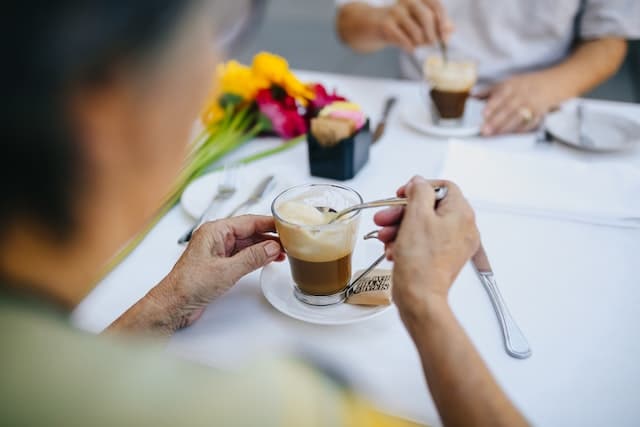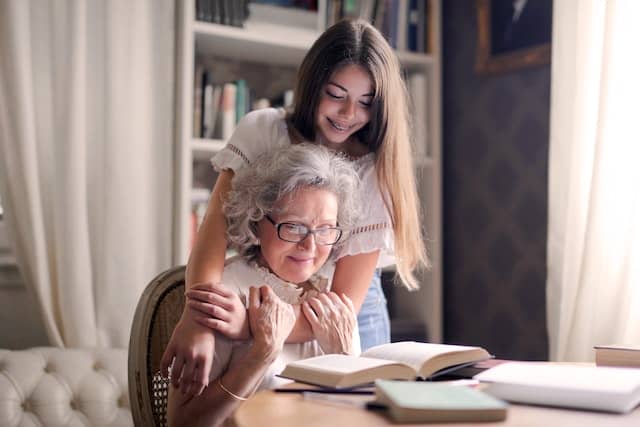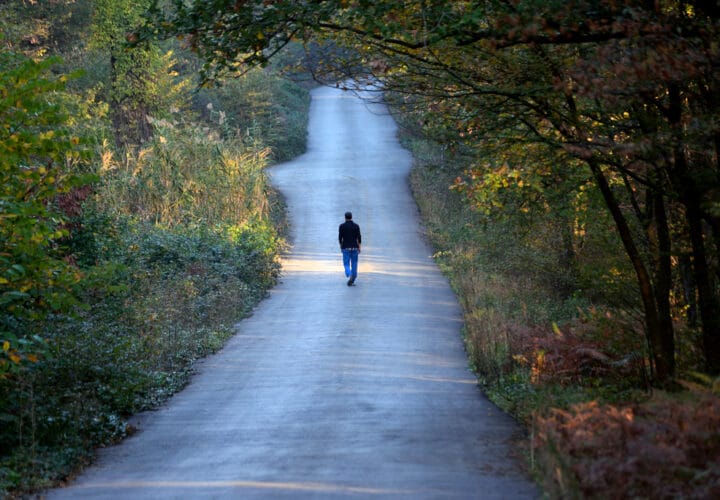Around the globe, memory cafes — virtual and in-person gatherings people who are living with dementia and their caregivers — are growing more popular.
When people log in to join a Jewish Family & Children’s Service memory cafe online, they might hear from an Afro-Latin music expert about the percussive sounds that can be made with a talking drum. They might practice seated yoga poses in front of their computers, or make their own colorful sun catchers at home. No matter the activity, the goal is the same: getting together with other people affected by dementia for some fun.
First created by a psychologist in the Netherlands in 1997, memory cafes are regular events where people living with dementia and caregivers can meet others with similar experiences. The gatherings can be an opportunity for people living with dementia and their loved ones to find community that, especially during COVID, they may not otherwise have.
“They provide a chance for people to have fun, to experience joy, to laugh together, to get a fresh perspective, and to meet other people who ‘get it,’” said Beth Soltzberg, who has been organizing the JF&CS memory cafe in Boston since 2014 and coordinates a network that provides tools and support to other memory cafes.
In the past three decades, memory cafes have become increasingly popular around the world as a way to provide support and build connections among people affected by dementia. Before the pandemic, memory cafes typically met in person, in libraries, nursing homes or social service organizations. COVID-19 shifted meetings online. Now, some groups have resumed in person, while many continue virtually.
Even before the pandemic, people living with dementia and care partners were at a high risk of social isolation, noted Soltzberg. According to Soltzberg, friendships may fall off as activities and social settings people once enjoyed may not work well for them anymore.
“There is still a great deal of stigma, lack of awareness, fear about dementia,” Soltzberg said. “So many people who find their way to a cafe will say, ‘All of our friends have disappeared.’”
Memory cafes are open to people living with dementia, caregivers, friends, and anybody who wants to be there. Nobody is asked what their diagnosis is. While cafes can be an opportunity for attendees to learn about other formal services, the gatherings are intentionally casual.
Research shows that participants look forward to the cafes, find them stimulating, and feel a sense of belonging. Researcher Sara Masoud, University of Texas Health Science Center at San Antonio PhD candidate, found in her study that memory cafes also provide a setting where people living with dementia feel accomplished, focusing on what they’re still able to do.
Memory cafes can benefit caregivers, too. Family caregivers are also at risk of social isolation and feelings of burnout, and stress compounded during the pandemic. Masoud’s research found cafes can offer a break from daily routine, and can be an opportunity to learn tips from others in similar roles.
Masoud, who runs a memory cafe and coordinates a network of cafes as part of her work with the Caring for the Caregiver program, noted that though cafes aim to be inclusive, there are many who aren’t able to participate. Some people live in areas where there is no local memory cafe group. While virtual cafes, which emerged during the pandemic, allow attendees to join from far away, some households do not have computer or internet access.
It’s important that memory cafe coordinators are aware that they might not be reaching everybody who could benefit from the gatherings, Masoud said.
“It remains a problem,” she added. “How do we support the families impacted by dementia who don’t have those abilities to participate?”
On the menu at memory cafes: Fun, food, and creativity
According to Soltzberg, cafe coordinators across the country have come up with many creative ways to engage participants. One organizer baked cookies during online pandemic sessions and had volunteers drop the sweets off the next day.
Masoud sat in on a virtual memory cafe hosted by a memory care facility that created craft packets and distributed them the day before each online event. From their own homes, participants would learn how to do things like make jam and paint vases together.
Masoud’s cafe started holding events themed around things participants said they always wanted to do. One attendee had always wanted to be in a band. So, with the guidance of a choir director, the group learned to play a song on home-made instruments and performed it. Another cafe regular had long wanted to learn to make mosaics — which the group got to try at a session in a park.
Cafes don’t need to have supplies, Masoud said. For one cafe, she crowdsourced questions that people wished they had asked their grandparents, then used the questions as prompts. Asked about smells from childhood, one man beautifully described how his father, who worked in the woods, always smelled of pine.
“These are people living with dementia who are sharing things in a really non-confrontational way to engage with their memory in a way that is positive and comforting,” Masoud said.
Building connections, old and new
To get the most out of an experience at a memory cafe, Soltzberg advises people to bring a friend.
“A lot of people stop staying connected with their friends because they don’t know how to spend time together anymore,” she said. Having a standing date to attend a memory cafe monthly or quarterly is a built-in activity to do together, and can help friends learn communication techniques to make interactions easier in other settings.
Memory cafes can also be a chance for attendees to learn about other resources. Masoud said she invites representatives from other organizations that help families dealing with dementia. She asks the representatives to dress casually and come prepared to join in the activity, rather than present a formal pitch.
Participation without pressure
Organizers want people to feel comfortable, not to put them on the spot.
When Masoud was trying to foster more conversation among online cafe attendees early in the pandemic, she reached out to some caregiver regulars and asked them to jump in with questions for other participants. The questions helped break the ice, she said. She is aware of other cafes that encouraged participants to be in touch with each other outside of sessions by setting up pen pals.
New social situations can be overwhelming, so organizers are mindful of orchestrating opportunities for conversation that take the pressure off. For example, at an in-person event, Masoud may partner a student volunteer with a quieter attendee, helping create an organic-feeling moment for them to connect.
At memory cafes, people should feel welcome to be involved as much as they’d like, according to Soltzberg.
“It’s really important that these are places where people don’t have to feel they have a particular expertise,” Soltzberg said. “It’s just: we’re a group of nice people who care about each other, who are hanging out, and we want to hear from you.”
A memory cafe near you
Find local memory cafes in the U.S. and several other countries on the Memory Cafe Directory.
Virtual memory cafes, that you can attend from home, are listed here.
The JF&CS Memory Cafe Percolator has resources to help organizers start and run their own cafes.




